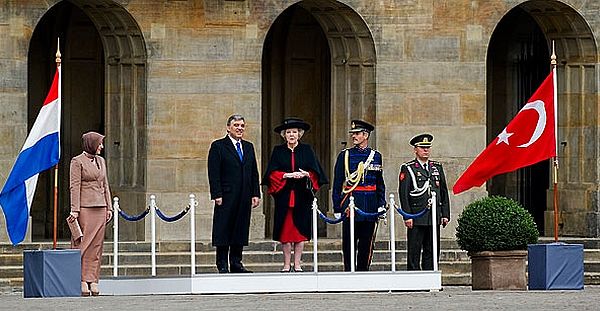Turkish President Abdullah Gül's recent visit to the Netherlands kicked up a lot of fuss. On the one hand there were usual islamophobic comments by Dutch far-right politician Geert Wilders.
He tweeted that Gül is a 'Christian-bully, Kurd-hitter, Hamas-friend and islamist'. On the other hand there were the usual laudations of the 'Turkish economic boom' and celebrations of diplomatic ties. According to the latter crowd, Turkey is supposed to be a role model for the rest of the Middle East, especially in light of the Arab Spring.
Geert Wilders' PVV (Party for Freedom) was a 'tolerating' partner in the Dutch minority government. One day after Gül had left Holland and after almost two years of buttressing neoliberal policies, Geert Wilders decided to walk away from another round of austerity. In polls the PVV had been steadily losing its electorate. By walking away Wilders hopes to regain voters during early elections in September.
The PVV diverts the people's attention from substantial issues. Instead the PVV makes them focus on hollow themes such as the so-called islamization of Europe.
Thus, the unprecedented cutbacks on the Dutch welfare state and the dismantling of many gained rights are topics that are underplayed. One has to be delusionary in order to miss how the PVV has done the exact opposite of virtually all of its social and economic promises. Moreover, it has done this by utilizing selective diversions like the anti-Gül tweet.
In fact, Wilders' PVV and Gül's former party Justice and Development Party (AKP) have much more in common than they perhaps realize. Both are successful protest parties. The PVV channels popular discomfort toward Dutch people of Muslim descent and the 'left-wing elites'.
The AKP channels discomfort towards the 'corrupt secular elites' and their ostensible intellectual supporters. Meanwhile, both parties have been implementing social and economic policies against which they rhetorically agitate.
Until the flotilla-incident in 2010, Turkey was buying 'Heron' drones from Israel. The AKP government deploys drones against Kurds in southeastern Turkey and in northern Iraq.
Wilders, who is rabidly pro-Zionist and associates with far right American groups, will never condemn Israel and the United States. Even though both countries have decisively aided and abetted Turkey in its 'Kurd-hitting' during the past thirty years.
Opposite to Wilders' tweet there was an euphoric reception of Gül. This euphoria was equally unmotivated by a real concern for the population of Turkey.
Dutch Prime Minister Mark Rutte emphasized 'strong economic ties' and 'many created jobs' between both countries and Queen Beatrix praised Turkey's 'model role' for the Middle-East. These comments echo the superficial fallacy that Turkey is 'booming' because of its growing economy.
Economic growth is measured by Gross Demostic Product (GDP) growth. GDP growth or even GDP per capita does not say anything about income equality. The proponents of the 'Turkish model' fallacy never look into this question, let alone remember how right until the Arab Spring Egypt was similarly glorified by the west.
International Monetary Fund (IMF) reports, OECD analyses, journalistic outlets and CEO's praised Egypt for its economic growth and 'stability' as well as for the 'preferential agreements' given by Hosni Mubarak. In January 2011 we suddenly found out that 40 percent of Egyptians has to get by with $ 2 a day or less.
Let us look closer at the claims made by the Dutch Prime Minister and Queen.
Economic ties between Holland and Turkey have been growing but it is preposterous to call them 'strong'. First of all, the trade balance is in Holland's favor. This should not be surprising because the much lauded economic growth of Turkey is to a significant degree based on imports. Consequently, the Turkish trade deficit has reached a record high of $ 105 billion in 2011.
In 2011 Holland exported 4,7 billion euros worth of goods to Turkey, which amounts to about 1 percent of all Dutch export for that year. Moreover, most Dutch export to Turkey consists of computers and spare parts that are produced in Asia and are distributed through Holland. In other words, it seems like the 'strong Dutch-Turkish economic ties' mostly create jobs in Chinese assembly plants.
After Turkey joined the neoliberal Washington Consensus in the early 1980s official unemployment had been structurally high, around 8 percent. Under the AKP government official unemployment has increased to about 11 percent.
Currently more than half of Turkey's population is 30 years or younger, of which many are educated, tech-savy and jobless; official youth unemployment is more than 25 percent. Bear in mind that these official statistics, as worrying as they are, do not reflect real unemployment, which is even much higher.
For those of you who have been paying attention during the Arab Spring, these figures should ring a heavy bell.
The amount of Turkish people living below the official poverty line is around 18 percent. But this number would be more than 50 percent if a realistic poverty line of $ 4,3 per day would be taken as a measurement. Basic labor rights have reached new nadirs. The United Nations' (UN) International Labor Organisation (ILO) has put Turkey on a black list along with countries like Belarus, Djibouti and Ethiopia.
Other democratically relevant criteria also indicate that Gül's Turkey is going backward. Because of the AKP's neoliberal policies as well as the growing patriarchal-religious climate women's labor participation has dramatically decreased. Similar regressions apply to female access to education. Consequently, Turkey currently ranks only 122 out of 134 countries on the World Economic Forum's Gender Gap Index.
Moreover, Turkey is world leader in persecuting journalists and intellectuals. Draconian laws are used to muzzle dissent. Turkey is now jailing more 'terror suspects', including 600 children and students, than anywhere else in the world.
In short, Turkey is certainly a model for the Middle-East if we consider an authoritarian government, suppression of basic rights and a neoliberal economic agenda to be a good thing. (ZÖ/BA)
* By Zihni Özdil, Social Historian at Erasmus University Rotterdam, the Netherlands





